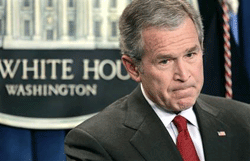
WASHINGTON (IPS) With U.S. President George W. Bush reiterating his threat to veto legislation that makes funding for the Iraq war conditional on a deadline for withdrawing at least some U.S. troops, Washington moved rapidly this week toward a major confrontation between the White House and Democrats in Congress.
The latter won a major victory Tuesday when the Senate voted 50-48 to reject an administration-backed amendment that would have stripped from the pending emergency military-spending bill a timetable for the withdrawal of all U.S. combat troops by the end of March 2008.
The 124-billion-dollar bill, which passed early Thursday, must still be reconciled with a version passed earlier by the House of Representatives that sets an Aug. 31, 2008 deadline for withdrawing all combat troops before it gets to the president’s desk.
But the fact that both versions contain withdrawal dates makes it virtually certain that the bill go to the White House with conditions that Bush has said are unacceptable.
Indeed, the president repeated his veto threat during an appearance Wednesday before a convention of the National Cattleman’s Beef Association here.
“If either version of the bill comes to my desk, I am going to veto it,” he declared. “Here’s the bottom line: the House and Senate bills have too much pork, too many conditions on our (military) commanders, and an artificial timetable for withdrawal,” he said, warning that current funding for U.S. forces will begin running out in mid-April unless supplemental funding is approved.
“Members of Congress need to stop making political statements and start providing vital funds for our troops,” he said. “They need to get that bill to my desk so I can sign it into law.”
While Bush’s words bespoke confidence that he can win the looming confrontation and force Democrats to delete references to a withdrawal deadline, the president’s political position is widely seen as continuing to erode.
Several recent scandals have spurred Congressional investigations that have put the White House into an increasingly defensive crouch and prompted even some loyal Republican lawmakers to publicly distance themselves from the administration.
Particularly damaging have been disclosures surrounding last year’s firing of eight federal prosecutors, apparently for being insufficiently protective of Republican interests, and which may soon cost Attorney General Alberto Gonzales, a long-time Bush crony, his job and force Bush’s top political aide, Karl Rove, to testify before Congress on his role.
“In half a century, I have not seen a president so isolated from his own party in Congress not Jimmy Carter, not even Richard Nixon as he faced impeachment,” wrote veteran right-wing columnist Robert Novak earlier this week.
That assessment was echoed by an astonishing “Insiders Poll” of 84 key Republican activists and organizers conducted last week by the influential “National Journal.” A whopping 84 percent of respondents described the Bush administration as a net “liability” for the party; more than half said it was a “major liability.”
While the latest scandals undoubtedly weighed heavily in their assessment, Bush’s handling of the war most recently, his determination to add as many as 35,000 troops to the 135,000 who were deployed to Iraq as of mid-January remains the single biggest drag on both his approval rating and future Republican political prospects, according to most analysts.
A major public opinion survey released earlier this week by the Pew Research Centre found that nearly six in 10 respondents (59 percent), including 34 percent of self-described Republicans, want their Congressional representatives to support legislation that requires the withdrawal of U.S. forces from Iraq no later than August 2008.
The same survey found that a majority of self-described Democrats and a strong plurality of independents also believed that Congress should assert greater control over U.S. policy in Iraq.
The vehicle for asserting that control has been the administration’s request for nearly 100 billion dollars in its emergency 2007 supplemental defense appropriations bill to maintain funding for U.S. military operations in Iraq, Afghanistan and elsewhere in the “war on terror.”
Democrats decided already in January after Bush rejected recommendations by the bipartisan Iraq Study Group (ISG) and announced his “surge” of additional troops into Baghdad and al-Anbar province that they would try to force Bush to change course in Iraq by imposing conditions on the supplemental bill.
That effort was formally launched last week when the House voted 218-212 to impose the August 2008 deadline for the withdrawal of all U.S. combat troops.
The vote, a major test of the new Democratic leadership’s ability to impose discipline on left-wingers who pressed for a much earlier withdrawal date and conservatives fearful of being charged by Republicans with “not supporting our troops,” was characterized as “hugely significant” by “Washington Post” columnist E.J. Dionne, who wrote that it “confirmed that power in Washington has indeed shifted.”
Tuesday’s Senate vote appeared to confirm Dionne’s assessment.
Just two weeks ago, the Senate rejected a resolution that called for a withdrawal by the end of March 2008 in a 50-48 vote when three Democrats crossed the aisle, while all but one Republican remained united in opposition.
But Tuesday, the two senators from the conservative Midwestern state of Nebraska Democrat Ben Nelson and Republican Chuck Hagel who had voted with the majority two weeks ago, switched sides. Hagel, who is believed to considering a presidential bid, was particularly outspoken during the debate calling Bush’s “surge” a “flawed and failing policy.”
While, unlike the House bill, the Senate version of the appropriations bill is technically non-binding in that it sets Mar. 31, 2008 (the same date recommended by the bipartisan ISG) as the “goal” for completing the withdrawal of combat troops, rather than as a fixed deadline, it also calls for withdrawal to begin no later than 120 days from the date that the bill becomes law.
The fact that majorities, however slender, in both houses of Congress, have now voted for a timeline for withdrawal marks a major turning point in Iraq policy, according to many analysts. “This is the first time that Congress has stood up and said ‘We’re not going to write blank checks for the war in Iraq’,” said Jim Cason of the Friends Committee on National Legislation, a Quaker lobby group.
Still, Cason and others believe that the battle over control of Iraq policy will be a long and difficult one. “This is not one battle; it’s a long-term campaign,” said Democratic Sen. Charles Schumer Tuesday. “Every time we have a vote like this, it ratchets up the pressure on the president and on many of those in his party.”






Leave a Reply